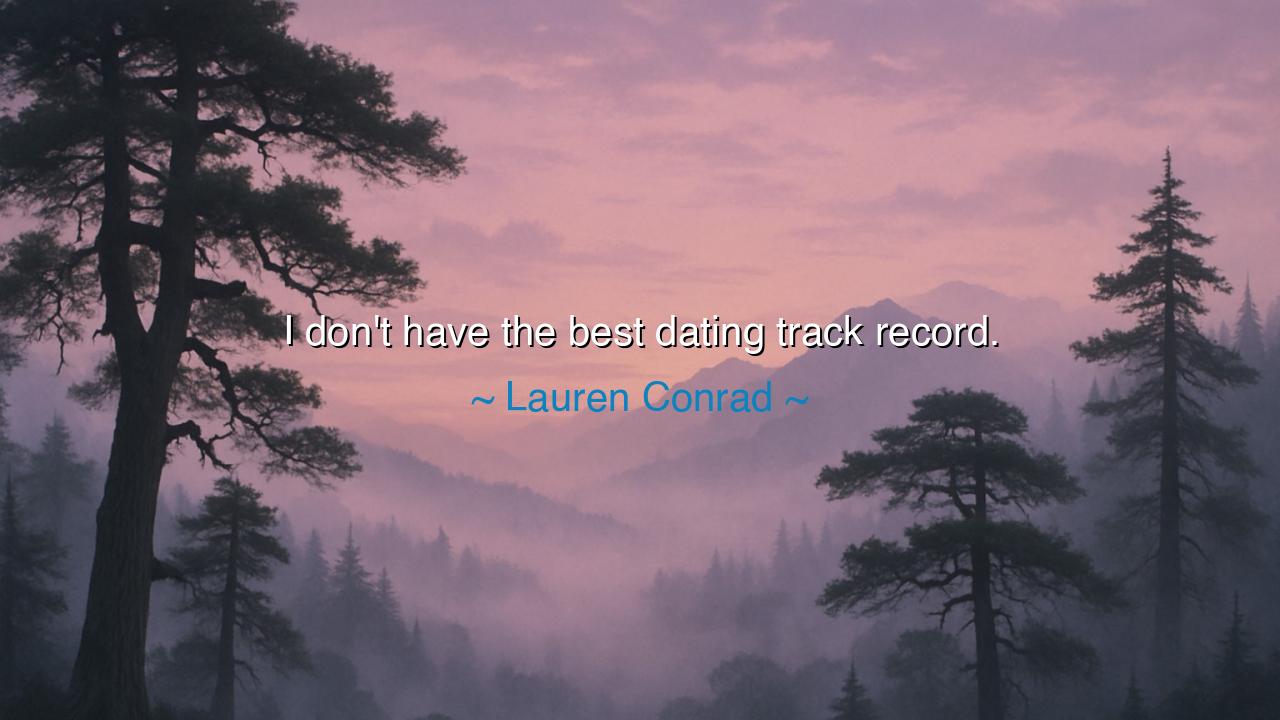
I don't have the best dating track record.






In the ancient tongue of wisdom, the words “I don’t have the best dating track record” might seem simple, yet beneath their softness lies the trembling pulse of human truth. To admit one’s failures in love is to confess not weakness, but awareness. For love, like the sea, is vast and restless — it teaches not through calm waters, but through storms that break and rebuild the heart. When Lauren Conrad spoke these words, she was not merely reflecting upon her romantic past; she was invoking the age-old human journey of falling, learning, and rising again from the ashes of affection unreturned or undone.
In the echo of such words, we hear the wisdom of the ancients — those who knew that the heart, though fragile, is a vessel of divine growth. To have a poor “track record” is not to fail, but to have dared greatly. The coward knows no heartbreak because they have never offered their heart upon the altar of chance. It is the brave who are scarred by love, yet it is they who live most vividly. So too, in Conrad’s confession, we see courage — the courage to speak one’s truth with gentle honesty, unmasked by pride.
Think of Cleopatra, whose loves were legends carved into the stone of time. She was no stranger to failure in matters of the heart, for even her passions, fiery and regal, led to ruin. Yet from those broken unions rose an empire of memory — her name immortal, her heart undiminished. Or recall Elizabeth Taylor, whose many loves became the tapestry of a woman unafraid to begin again. Their “track records,” if measured by outcome alone, would seem flawed; yet, in truth, they were records of becoming — of hearts that refused to wither in silence.
The meaning of Conrad’s words lies not in regret, but in renewal. To say “I don’t have the best dating track record” is to admit, “I have lived.” It is a mark of humility and growth, a reminder that perfection in love is neither promised nor required. Every heartbreak chisels the soul, shaping it into something wiser, more compassionate, more capable of recognizing true love when it finally appears. The ancients would call this the “refining fire of Eros” — the sacred burn that transforms the naive lover into the wise one.
We must not mock the one who has loved and lost, for they have walked paths the timid never tread. The ancients taught that wisdom often hides in the ruins of our choices. The scars of love are not blemishes, but seals of experience. Even the gods, in their celestial tales, suffered love’s folly — Zeus for his endless pursuits, Aphrodite for her jealousies, and Orpheus for his tragic devotion. To love imperfectly is to be profoundly human.
Thus, let this teaching be written in your heart: Do not fear your past loves, nor the failures they carry. Each ending is a lesson; each mistake, a compass turning you toward your truth. If your record of love is marked with sorrow, remember — so too is the music of life. The melody of the heart is never without its minor chords. Accept them, for they make the harmony whole.
And so, what shall one do? Reflect, but do not dwell. Forgive yourself for loving the wrong person, for believing too soon, for staying too long. In your solitude, build your strength, not your walls. When next you love, love with awareness — not as one seeking to fill a void, but as one offering fullness. Let your “track record” not be a ledger of failures, but a chronicle of your evolution. For the one who learns from love, even from its wreckage, shall one day write their final chapter in peace, whispering, “Every wound was worth the wisdom it gave.”






AAdministratorAdministrator
Welcome, honored guests. Please leave a comment, we will respond soon